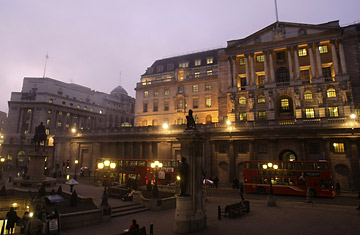
The Bank of England in the City of London, UK
It is stunning to think that Americans have begun to believe that this recession and the effects that it will have on their lives could go on for years. It is more surprising that, to some extent, they have come to peace with that.
According to a poll published in The New York Times, Americans believe in Barack Obama's ability to change the course of the economy, health care, and the war in Iraq, but they understand that it may take at least two years to see some results. In terms of the length of the recession it is a capitulation of sorts, an admission that the financial straights in which the economy finds itself has no ready solution. (See pictures of the world reacting to Obama's win.)
One of the arguments that economists and government officials have begun to make is that whatever is being done to change the course of the downturn is being done too slowly, putting off well into the future the time when any recovery begins
In the U.K., one of the nation's premier experts on the financial world, Peter Spencer, chief economic adviser to the Ernst & Young ITEM Club, said that the time to save the U.K. from severe GDP contraction may have come and gone. According to The Daily Telegraph, The Government and the Bank of England have got "days not weeks" to take action to revive the economy or face a prolonged depression.
The viewpoints from the U.S. poll and the U.K. economists are two sides of one coin. People need to brace themselves for a long and painful period, and to some extent that process has begun.
Going back several months, surveys of experts often reported that they did not think the U.S. economy would slip into a downturn until late 2008 and would begin to recover at the middle of this year. Data which has emerged in the last few weeks shows that America's GDP growth hit a wall much earlier last year. The consensus among economists now is that any recovery will begin late this year. More and more experts are beginning to push the date for any improvement well into 2010.
The deferring of critical decisions about how to rescue the financial system, housing, rising unemployment, and consumer spending will be blamed on the months of transition between the election of a new president and his inauguration. The observation is fair but it is also pointless. If a runaway train is gaining speed at a dangerous rate, all that matters is whether someone pulls the brakes.The train will not have a bias about who that might be.
The economy is just like that train. Set it on a course of mayhem, unbridled, and it will stay on the course inexorably and indefinitely.
The British economists and the results of the American poll are both right. Fast action was as critical to saving the economy as the nature of the action. Patience will be necessary because the downturn is almost certainly going to be remarkably long and hard.
The war for the economy's future is now entering a stage of experimentation. No one has seen anything like the current state of affairs, so no one knows how to improve them. That, in and of itself, means that being impatient is past the point of effectiveness.
— Douglas A. McIntyre
See pictures of the global financial crisis.
For constant business updates, go to 24/7wallst.com
